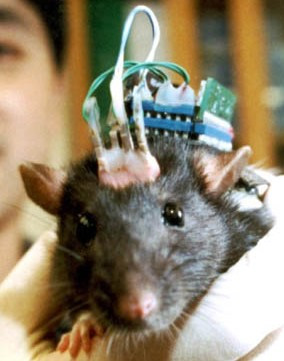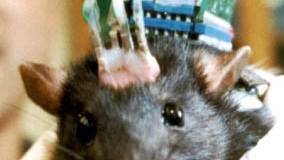Scientists Create Rat Cyborg With Artificial Cerebellum
Source: newscientist.com
 An artificial cerebellum has restored lost brain function in rats, bringing the prospect of cyborg-style brain implants a step closer to reality
An artificial cerebellum has restored lost brain function in rats, bringing the prospect of cyborg-style brain implants a step closer to realityAN ARTIFICIAL cerebellum has restored lost brain function in rats, bringing the prospect of cyborg-style brain implants a step closer to reality. Such implants could eventually be used to replace areas of brain tissue damaged by stroke and other conditions, or even to enhance healthy brain function and restore learning processes that decline with age.
Cochlear implants and prosthetic limbs have already proved that it is possible to wire electrical devices into the brain and make sense of them, but such devices involve only one-way communication, either from the device to the brain or vice versa.
Now Matti Mintz of Tel Aviv University in Israel and his colleagues have created a synthetic cerebellum which can receive sensory inputs from the brainstem - a region that acts as a conduit for neuronal information from the rest of the body. Their device can interpret these inputs, and send a signal to a different region of the brainstem that prompts motor neurons to execute the appropriate movement.
"It’s proof of concept that we can record information from the brain, analyse it in a way similar to the biological network, and return it to the brain," says Mintz, who presented the work this month at the Strategies for Engineered Negligible Senescence meeting in Cambridge, UK.
One of the functions of the cerebellum is to help coordinate and time movements. This, and the fact that it has a relatively straightforward neuronal architecture, make it a good region of the brain to synthesise. "We know its anatomy and some of its behaviours almost perfectly," says Mintz. The team analysed brainstem signals feeding into a real cerebellum and the output it generated in response. They then used this information to generate a synthetic version on a chip that sits outside the skull and is wired into the brain using electrodes.
To test the chip, they anaesthetised a rat and disabled its cerebellum before hooking up their synthetic version. They then tried to teach the anaesthetised animal a conditioned motor reflex - a blink - by combining an auditory tone with a puff of air on the eye, until the animal blinked on hearing the tone alone. They first tried this without the chip connected, and found the rat was unable to learn the motor reflex. But once the artificial cerebellum was connected, the rat behaved as a normal animal would, learning to connect the sound with the need to blink.
"This demonstrates how far we have come towards creating circuitry that could one day replace damaged brain areas and even enhance the power of the healthy brain," says Francesco Sepulveda of the University of Essex in Colchester, UK, who was not involved in the research. "The circuitry mimics functionality that is very basic. Nonetheless, this is an exciting step towards enormous possibilities."
The next step is to model larger areas of the cerebellum that can learn a sequence of movements and test the chip in a conscious animal - a much greater challenge. "This is very demanding because of the decrease of [neural] signal quality due to artefacts caused by movement," says Robert Prueckl of Guger Technologies in Graz, Austria, who is working with Mintz. He thinks this can be achieved, though, by developing improved software to tune out noise and better techniques for implanting the electrodes. Ultimately, the goal is to build chips that can replicate complex areas of the brain.
Such implants will be vastly more complex, but Sepulveda says the challenges aren’t insurmountable. "It will likely take us several decades to get there, but my bet is that specific, well-organised brain parts such as the hippocampus or the visual cortex will have synthetic correlates before the end of the century."
Source: newscientist.com






















